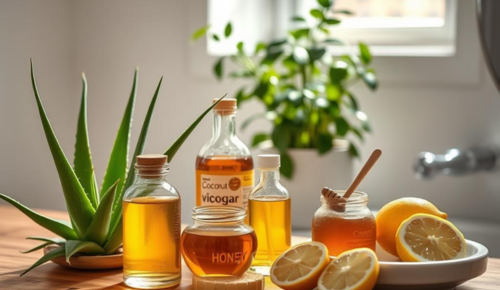Effective Dandruff Treatment: 12 Home Remedies to Get Rid of Dandruff
Description: Discover 12 effective home remedies to treat dandruff and itching. Learn how to care for your scalp and get rid of dandruff for healthier hair!
I know how frustrating dandruff can be. It causes embarrassing flakes and an itchy scalp. Nearly 50% of people worldwide deal with it, affecting their confidence and hair health. But there are natural and affordable ways for effective dandruff treatment at home.
This guide will show you 12 home remedies to help with dandruff. You’ll learn about using coconut oil, baking soda, tea tree oil, and aloe vera. These natural treatments are gentle and effective, without harsh chemicals.

Key Takeaways
- Dandruff affects nearly 50% of the global population, causing itchy, white flakes on the scalp.
- Natural home remedies such as coconut oil, tea tree oil, and aloe vera can effectively treat dandruff.
- These remedies aim to alleviate symptoms, reduce inflammation, and improve overall scalp health.
- Incorporating lifestyle changes like stress management and a consistent hair care routine can also help control dandruff.
- If over-the-counter treatments are not effective, consulting a healthcare professional for prescription options may be necessary.
Understanding Dandruff: Causes and Symptoms
Dandruff is a common scalp condition that affects millions. It often starts in young adulthood and lasts into middle age. This mild form of seborrheic dermatitis causes itchy, flaking skin on the scalp. It’s more common in males than females.
What Causes Dandruff Development
Many factors can lead to dandruff. These include oily skin, certain medical conditions, and hair care routines. People with Parkinson’s disease, other nervous system disorders, HIV, or a weakened immune system are more likely to get dandruff. The Malassezia yeast on the scalp can also trigger dandruff by causing irritation and inflammation.
Common Symptoms and Signs
The main signs of dandruff are white or yellowish flakes and an itchy scalp. Sometimes, the scalp can also become red. In severe cases, dandruff can cause hair loss and dry, flaky skin on the face, eyebrows, and other areas.
Impact on Scalp Health
Dandruff can harm scalp health by causing irritation and inflammation. If not treated, it can get worse, turning into a more serious seborrheic dermatitis. Knowing the causes and symptoms of dandruff is key to treating it and keeping the scalp healthy.
The Role of Natural Oils in Treating Dandruff
Natural oils are a great way to fight dandruff. They have special powers that help fight the causes of dandruff. These oils are good at fighting germs and reducing swelling.
Tea tree oil is very good at fighting fungus. It has a special part called terpinen-4-ol. This part stops the fungus that causes dandruff. A few drops on your scalp can make it feel better and look cleaner.
Coconut oil is also great for dandruff. It has lauric acid, which fights yeast on your scalp. It also makes your scalp feel moist, which helps with dryness.
Aloe vera gel is amazing for your scalp. It has special parts that calm and heal. Rubbing aloe vera gel on your scalp before washing can make it feel better and look less flaky.
These natural oils are good alternatives to store-bought treatments. They are kinder to your scalp and help it feel better. Using them can help you control dandruff and feel better.
| Natural Oil | Key Compound | Benefits for Dandruff |
| Tea Tree Oil | Terpinen-4-ol | Antifungal properties, reduces inflammation |
| Coconut Oil | Lauric Acid | Antifungal, moisturizes the scalp |
| Aloe Vera | Bioactive Compounds | Anti-inflammatory, promotes healing |
Effective Dandruff Treatment: 12 Home Remedies to Get Rid of Dandruff
Dealing with dandruff doesn’t need to cost a lot. Many kitchen items and natural solutions work well against this scalp problem. Here are 12 home remedies to fight dandruff and keep your scalp healthy:
Kitchen Ingredients as Remedies
Apple cider vinegar balances your scalp’s pH and gets rid of product buildup. It’s great for dandruff and itchiness. Lemon juice has vitamin C, citric acid, and iron for healthy hair. Baking soda cleanses your scalp, absorbs oil, and fights dandruff bacteria.
Herbal Solutions for Scalp Care
- Aloe vera gel reduces scalp irritation and flakes with its anti-inflammatory and antifungal properties.
- Tea tree oil helps with itching and white flakes from dandruff because of its anti-inflammatory and anti-fungal benefits.
- Neem treats dandruff and skin problems with its antibacterial and antimicrobial properties.
Application Methods and Timing
Using these home remedies right is key. For example, a lemongrass oil or olive oil treatment for 30 minutes before washing nourishes your scalp. Being consistent is important for controlling dandruff long-term.
Using natural ingredients from your kitchen and medicine cabinet can treat dandruff. Always test new remedies on a small area first to avoid skin reactions.
Lifestyle Changes for Dandruff Control
Controlling dandruff is more than just using treatments. It also means making lifestyle changes. These changes can greatly affect your scalp health. From managing stress to what you eat, your lifestyle can help or hurt your scalp.
Stress Management Techniques
Stress can make dandruff worse. Meditation and deep breathing can help lower stress. This can reduce inflammation and keep your scalp balanced.
Dietary Considerations
Your diet is key to a healthy scalp. Eating foods with omega-3 fatty acids, like salmon, can help. Also, eating biotin-rich foods, like liver, can fight dandruff.
Hair Care Routine
A good hair care routine helps control dandruff. Use fewer styling products and gentle, pH-balanced shampoos. Regular washing keeps your scalp balanced and stops dandruff-causing fungi.
By changing your lifestyle and using stress management, better diet, and hair care, you can fight dandruff. This will help your scalp stay healthy and look great.
| Lifestyle Factors | Impact on Dandruff |
| Stress management | Reduces inflammation and sebum production |
| Omega-3 rich diet | Supports scalp health and combats dandruff |
| Biotin-rich foods | Prevent seborrheic dermatitis, a common cause of dandruff |
| pH-balanced hair care | Reduces oil and dead skin cell buildup on the scalp |
Scientific Approaches to Dandruff Management
Dealing with stubborn dandruff needs a scientific approach. Knowing what causes it helps find lasting solutions.
Understanding pH Balance
Keeping your scalp’s pH right is key to fighting dandruff. If the pH is off, it can lead to fungus growth. Using zinc pyrithione or salicylic acid shampoos can fix this and stop fungus.
Anti-fungal Solutions
For tough dandruff, antifungal treatments work well. Ketoconazole in medicated shampoos fights fungus. Washing your hair regularly with these shampoos helps control dandruff.
Professional Treatment Options
For severe dandruff, see a dermatologist. They can give prescription treatments like strong antifungal shampoos. Sometimes, light therapy or special creams are needed for chronic conditions.
Understanding dandruff’s science and using the right treatments can help. You can get the healthy, flake-free hair you want.
What Role Does Proper Hair Hygiene Play in Dandruff Treatment at Home?
Proper hair hygiene plays a crucial role in the treatment of dandruff at home, particularly for those dealing with seborrheic dermatitis and dandruff. Regular washing helps to minimize build up on your hair and reduce scalp flakes caused when cells on your scalp die and flake. Depending on the type of dandruff, incorporating effective scalp treatments, such as massaging 3 to 5 teaspoons of lemon juice into your scalp or applying oil into your scalp, can mitigate flaky skin on the scalp. Dandruff may also be managed with over-the-counter dandruff shampoos, which contain active ingredients in dandruff formulations designed to combat dandruff and dry scalp conditions.
While dandruff results from a scalp condition that causes excessive shedding, maintaining a consistent hair care routine can alleviate typical dandruff cases. Though dandruff without proper hygiene might worsen, individuals should wash their hair regularly to promote better skin and hair health. Although dandruff can be stubborn, understanding the intimate connection between hair and skin care is paramount in achieving a healthy hair or scalp. Regular cleansing and targeted treatments may provide relief and help manage persistent dandruff problems.
Frequently Asked Questions
Q: What is the best dandruff shampoo to use for effective treatment?
A: The best dandruff shampoo often contains active ingredients like selenium sulfide, zinc pyrithione, or ketoconazole. These ingredients are designed to treat dandruff and can help reduce flakes and itching effectively.
Q: How often should I use dandruff shampoo for the best results?
A: It’s generally recommended to use dandruff shampoo twice a week for the best results. However, if you have a severe case of dandruff, you may need to shampoo your hair more frequently until symptoms improve.
Q: What home remedies can I use to prevent dandruff?
A: There are several DIY treatments you can try to prevent dandruff. These include using natural oils like coconut or tea tree oil, applying apple cider vinegar, or creating a yogurt mask for your scalp, all of which may help maintain scalp hygiene and moisture.
Q: Can dry scalp cause dandruff?
A: Yes, a dry scalp can lead to dandruff. The symptoms of dandruff include flaky scalp and irritation, which can be exacerbated by dry skin. Keeping your scalp moisturized can help prevent dandruff.
Q: Are there specific causes for dandruff I should be aware of?
A: Yes, causes for dandruff may include a dry scalp, seborrheic dermatitis, sensitivity to hair care products, or skin conditions like psoriasis. Understanding the underlying cause can help you choose the right treatments for dandruff.
Q: How can I quickly remove dandruff flakes from my hair?
A: To quickly remove dandruff flakes, use an anti-dandruff shampoo designed to treat dandruff. Additionally, regularly washing your hair can help reduce the build-up of skin cells on your scalp, leading to less visible flakes.
Q: Can using hair care products worsen dandruff?
A: Certain hair care products may exacerbate dandruff, especially if they contain harsh chemicals or fragrances. It’s important to choose gentle, sulfate-free shampoos and conditioners that are formulated for sensitive skin to minimize irritation.
Q: How can I tell if I have mild dandruff or a more severe scalp condition?
A: Symptoms of mild dandruff include occasional flakes and slight itching, while more severe conditions, such as seborrheic dermatitis, may involve persistent flakes, redness, and irritation. If you’re unsure, consulting a dermatologist can help determine the best treatment options.
Q: Will using a dandruff shampoo permanently get rid of my dandruff?
A: While dandruff shampoos can effectively treat and reduce dandruff, they may not provide a permanent solution. Consistent hair and scalp care, along with proper hygiene, may help prevent dandruff from returning.
Conclusion
Dandruff control can be achieved through proper hair care with home remedies, lifestyle changes, and expert advice. Ingredients like Bhringraj, neem, tea tree oil, and shikakai can help. But if the dandruff doesn’t go away, you might need to see a doctor.
Keeping your scalp clean and using the right treatments is crucial. This helps manage dandruff for good. By using these methods, you can keep your scalp flake-free and healthy. Dandruff is common, but it can be controlled with the right steps.
Choosing natural remedies or professional help, the main goal is to fix the dandruff’s cause. A proactive and tailored approach can lead to a healthy scalp and shiny hair.
For a variety of content focused on natural and herbal remedies for various healthcare concerns, please visit: Pure Remedy Solutions
Tags: dandruff treatment at home, hair care with home remedies, Pure Remedy Solutions, dandruff treatment, best dandruff treatment at home



